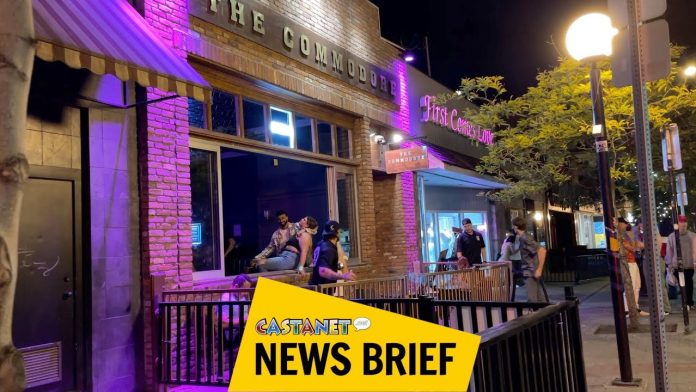Sydney Chisholm
Things are not like they used to be in Kamloops bars and nightclubs, and the COVID-19 pandemic is only partly to blame.
Nightclub owners, who are now dealing with ballooning insurance costs, say they have noticed a change in their clubs since fully reopening earlier this year.
“It’s a lot different, people [are] a lot more respectful,” Dino Bernardo, co-owner of the Commodore told Castanet Kamloops.
“It’s a lot different than what it used to be like — it’s not necessarily better or worse. It’s just the narrative has changed a little bit.”
Some in the industry say there was a decline of nightclub popularity a few years before the pandemic hit, but Blue Grotto owner Pup Johnston said COVID-19 changed all of that.
“Covid was like a shot in the arm for the industry. It was like we hit a great reset button. And what’s happening now is that we’re seeing people coming out and enjoying nightclubs that actually never had before,” Johnston said, adding physical distancing had people missing a crowed dance floor.
“They want the love and touching, squeezing, you know? They want to meet strangers, they want an opportunity to cross paths with somebody, share a dance floor with somebody, even if you’re not dancing together — you’re dancing with your group friends, I’m dancing with my group of friends, at some point we’re going to turn around and and there’s going to be high fives and all ‘the bands great.’’’
Despite the resurgence in popularity and lifted pandemic restrictions, nightclubs are still facing obstacles when it comes to running and opening new venues.
“It’s hard to open a nightclub nowadays, like really hard,” Johnston said.
“Like liquor liability insurance is just off the hook. It’s ridiculous. It’s gone up 500 per cent over COVID, and that makes it really cost prohibitive to open a new club — very, very cost prohibitive.”
While Bernardo said the Commodore is doing well, he worries about what the drastic increases in overhead will do to the industry as its not just insurance thats gone up.
“There’d be some some supply chain shortages of certain alcohols we can’t get in at times, the cost of fruit for drinks has gone drastically up,” he explained.
“I’m scared of, you know, this is what we’re experiencing now. What’s it going to be like in five months, six months, a year? Is that going to change? Or is it going to get worse?”
But on the other hand, owners can only raise prices so much before customers aren’t willing to pay it, Bernardo said.
“Our prices have been similar to what they’ve always been, even when we reopened,” the Commodore owner said.
“There was a marginal increase, but it was just it was basically just the cost of insurance went through the roof and we have to make up for that.”
The cost of liquor liability has more than tripled in the last few years, and a large contributing factor to the inflated price tag is the fact many insurance companies have opted out of the liquor game.
“There’s many providers around the world that provide liquor liability, but there’s not as many as there used to be,” Paul Ross, a broker at Emsland Insurance, told Castanet Kamloops.
“I think it has to do with the risk and it has to do with our litigious society and people suing for many different things. So insurance companies have decided not to have that as the risks that they have to defend.”
He said on top of that, insurance companies are still trying to recover from the pandemic’s blow to the economy.
“We’ve also had what’s called a hard market in the insurance industry. It’s been three years of insurance companies really correcting what’s happening,” he explained.
“We’ve also had more and more people wanting to sue in Canada, which creates more costs, we have social inflation, which relates to you know … the entitlement people have — they get drunk and they slip on the floor, and they want to sue the landlord, the tenant, the city [and] on and on. So our society and our habits have definitely changed as our overall direction, which negatively affects insurance companies.”
According to Ross, the ballooning insurance costs could be causing some bars to close and deterring other would-be owners from getting into the industry.
“I think what would happen is the cost would be prohibitive. I mean, that’s what’s happening now,” Ross said.
“The cost of this stuff is so prohibitive. How can a small business survive having to spend that much money on insurance? So, in essence, it may already have done so.”
Ross said the potential fix is pretty simple.
“Take more responsibility for your own actions,” he said.


































